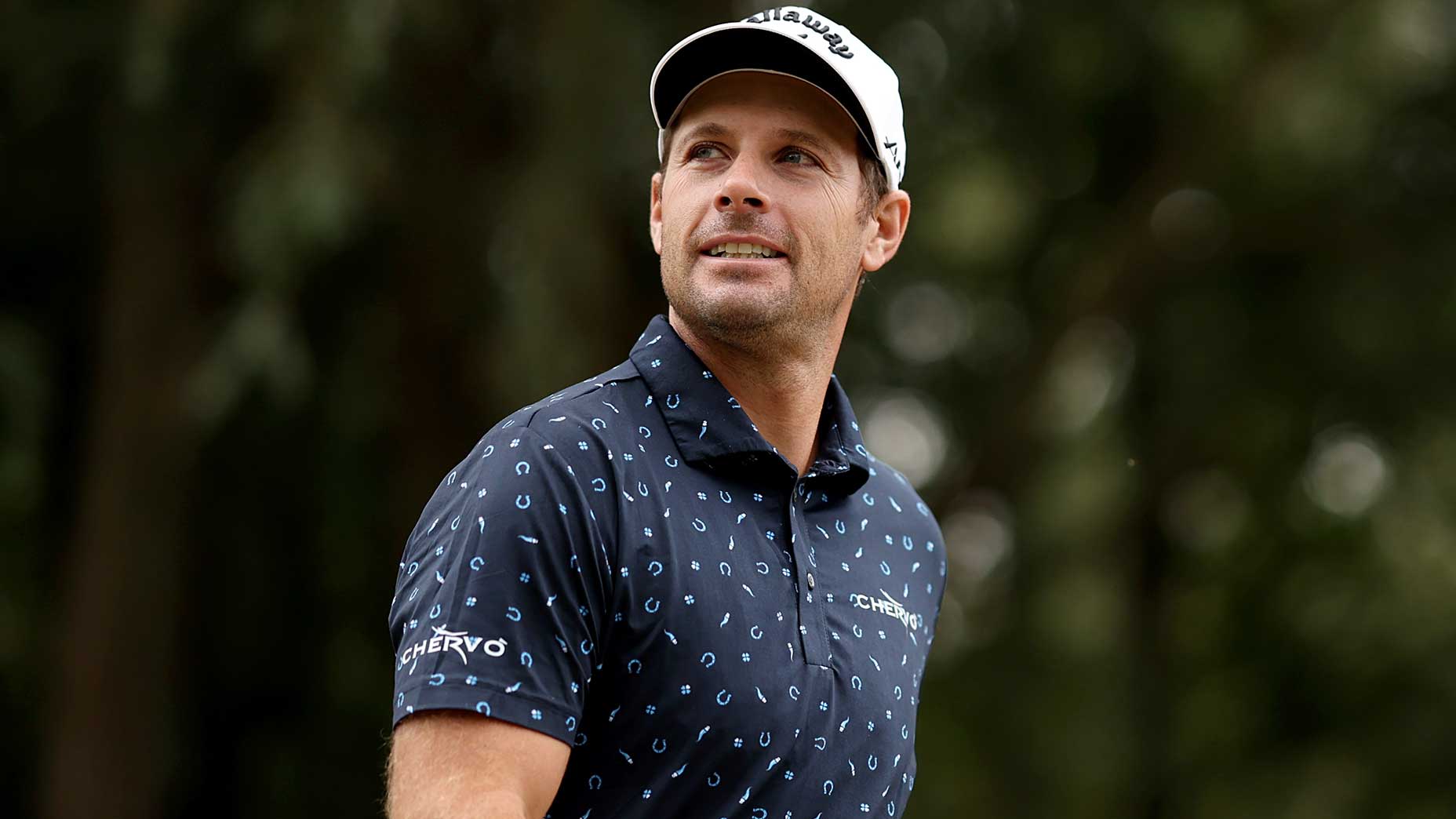 2026 Cognizant Classic Saturday tee times: Round 3 groupings
2026 Cognizant Classic Saturday tee times: Round 3 groupings
Tour Confidential: Did Brandel Chamblee go too far?

Check in every week for the unfiltered opinions of our writers and editors as they break down the hottest topics in the sport, and join the conversation by tweeting us @golf_com. This week we discuss Brandel Chamblee’s comments, the effects of a potential condensed schedule, whether the PGA Tour should aid its developmental tour, and more.
1. In an interview with Golfweek, straight-shooting Golf Channel commentator Brandel Chamblee sharply criticized modern-day golf instruction, claiming instructors hurt more PGA Tour players than they help and that teachers have been “exposed for their idiocy” by the bounty of instruction available on YouTube and elsewhere. He also offered a less-than-glowing review of the work Cameron McCormick has done with Jordan Spieth. Chamblee apologized for uttering an inappropriate phrase in the interview but otherwise has stood by his takes. His regrettable choice of words aside, did Chamblee cross any lines in his assessment of the state of golf instruction in 2020?
Michael Bamberger, senior writer: Not at all. He’s a provocateur! You can debate Brandel on any point he made, and that’s the point. Cameron McC is not having a great run lately, but he did witness Spieth’s three majors! Debate is healthy. Debate is good.
Dylan Dethier, senior writer (@dylan_dethier): I love it. And I think the reason Brandel has hit a nerve is because there is so much uncertainty, guesswork and instinct that are a part of teaching. Biomechanics can take you a long way. 3D models can, too. But there’s still plenty of art and philosophy mixed in with the science. It’d be one thing if Brandel didn’t do his homework, but he does — as much as any commentator in the game. As a result, challenging coaches of great players is fair game. They’re subject to criticism as much as Bill Belichick or Mike Tomlin.
Josh Sens, senior writer (@JoshSens): One of Chamblee’s points that can’t be debated is the sheer quantity of information out there. Anytime you have that kind of glut, there’s going to be a mix of the good, the bad, the ugly and the ill-informed. (Try checking out guitar lessons on YouTube if you want to have the musical equivalent of what Chamblee is talking about.) Chamblee is far from the first expert I’ve heard lament that some modern golf instruction has gone down a technology rabbit hole, but he is the most prominent. And the most credible. His take is more than fair fodder for debate.
Luke Kerr-Dineen, instruction editor (@LukeKerrDineen): Brandel is a very nice and very smart guy, and I genuinely like him. But he’s also got very defined ideas of how to swing a golf club. That’s great, but like anybody who preaches a doctrine, they overstate the strength of their own position and dismiss anything different. I work with our GOLF Top 100 Teachers on a daily basis, and each and every one of them pour their heart and soul into helping the student in front of them get better. They study the latest science, and they’re constantly learning and innovating. And guess what? It works! Professional golf is at a higher level now than it was because players are coached smarter, with information that’s rooted in evidence rather than marketing. As our teachers themselves will tell you, that doesn’t mean the industry doesn’t get lost in the weeds sometimes, and the challenge with using technology is that teachers are at the limitations of it. But that’s true of doctors, too; it doesn’t mean they should stop prescribing medication because there may be a better solution they haven’t discovered yet. On the whole, the use of technology has been a huge net good for teachers and students. It’s what has liberated talents like Matt Wolff and Viktor Hovland to swing their own swing, their best possible way. The instruction space is in a good spot and improving every day; the results will prove out over time.
2. The 2020 Ryder Cup is still on the schedule for Sept. 25-27 at Whistling Straits, but Tommy Fleetwood told Sky Sports News it would be most equitable to bump the event to next year. “From a fairness perspective, I think the qualification process should run its full course,” he said. Is Fleetwood right? Regardless of when the pro game resumes, should the Ryder Cup be moved to 2021?
Bamberger: Likely a good idea, and since Fleetwood is saying it, a very good idea. If we can still get golf in this year — and here’s hoping we can! — it would be best to see the regular events be played and the majors if they can be. Nothing really will be lost by waiting until next year for the Ryder Cup. Just like the Olympics.
Dethier: Assuming the Tour (and affiliated constituents) would agree to move the Presidents Cup back a year, too, this seems like a good and fine call. It would be a bummer, big-time, to miss out on team golf this year. But if there’s a run of majors that could happen in the late summer into fall, we’d have plenty of good action to watch while ensuring fair qualification for the following year.
Sens: Agreed on all of the above. And if the Ryder Cup does wind up getting pushed back, it will survive just fine, as it did when it was postponed in 2001. All the more time for the excitement to build.
LKD: With a big, whopping caveat that I am obviously not being briefed by scientists about the latest on the coronavirus outbreak, it seems far too early to make a call on the Ryder Cup. The Tour could be back up-and-running by May, with four months of play with a few majors squeezed in. It won’t be an ordinary qualification process, and it’s never going to be. These are extraordinary circumstances; the best we can do is try to roll with it.
3. According to the New York Post, the USGA has decided to postpone the U.S. Open until later this year, meaning the Open Championship is the only 2020 major that hasn’t yet been pushed. Assuming life returns to normal by early- or mid-summer and all four majors are squeezed into this calendar year, which players would the compressed schedule most benefit, and which players would it hurt?
Bamberger: Koepka comes to mind, because of his strength, because he gets on rolls more than most, because majors seems to be what he lives for. Tiger would be hurt because he needs such long breaks between events.
Dethier: Au contraire, Tiger might do just fine because he could play the majors and nothing else. The typical schedule has a full month between majors, which seems like too long to rest but too short to squeeze in another event. This could benefit Woods, if they’re spaced right. The whole thing disadvantages players who like to tee it up early and often and have a heater going. Sungjae Im comes to mind. Patrick Reed had been strong, too. Bryson was finding form. Time will tell if that holds true through the layoff.
Sens: Even at the highest level, golf is streaky, so as Dylan says, the guys who were running hot already have to feel like they’ve gotten shortchanged. Given his Terminator-like endurance, maybe this will be the year of the Sungjae Slam.
LKD: I mean, who knows. Most players aren’t even playing golf at the moment, so it’s all truly very up in the air. Whenever golf does get back up and running, it’ll favor whichever players tend to run the table when they get hot, because they could walk away from 2020 with a couple majors. Rory, obviously, fits that category. Webb Simpson, too.
ADVERTISEMENT
4. The PGA Tour has developed a plan to offer its players and caddies financial aid during the hiatus, with players being offered various advances, and caddies receiving a distribution of $250,000 from the Valspar Caddie Hat program, and an increase of the balances available for caddies under the caddie benevolent fund. But the Tour has not yet announced any plans to assist Korn Ferry Tour players in a way that, say, Major League Baseball is giving its minor leaguers a weekly stipend. Any thoughts on if/how the Tour could/should help out the players on its developmental circuit?
Bamberger: I’m sure these issues are far more complex than I could understand, but my starting point would be, of course, help those first who need the help the most. If the PGA Tour is really a family, as it describes itself in times of need, it already knows that and operates under that principle. Here’s hoping it does, anyhow. I’d be more worried about the wait staff at TPC Sawgrass, etc.
Dethier: It makes sense to follow a similar model, where Korn Ferry players could borrow against their future earnings, to help string things out a bit. But I understand the reluctance from the Tour — few things are less certain than a pro golfer’s next paycheck. There are plenty of benefits to the freedom of these “independent contractors” — this is where it really gets tricky to figure out who’s responsible for taking care of whom.
Sens: Strikes me as a can of worms the Tour is unlikely to open, as once you get started, where do you stop? Though it does seem a bit backward to start at the top circuit and work down, rather than the other way around. How about the same deal for all fully exempt Korn Ferry players and their caddies?
LKD: It’s very easy for me to say the Tour should do that. It would be great that they did, but it’s also a business, and with no money currently coming in, the potential for its rights deals to be affected by all this and everything else, there’s no use being idealistic. It would be nice, of course. I’d love it if it happened, but I have no idea if it’s financially feasible for them to take on that commitment.
5. Auctions are proving to be a popular way for golf to help fight the coronavirus. A number of big-name players are hawking signed memorabilia for the cause, while Pinehurst Resort is auctioning a number of creative experiences — fancy having The Cradle par-3 course to yourself for half a day? — for guests to enjoy. Put on your fundraising cap and dream up another golfy auction item that golf-lovers couldn’t resist. Anything goes!
Bamberger: Play Augusta National Golf Club with Tiger, lunch in the Champions locker room. For two. Breakfast with Annika, no handshaking. Pancakes made to order. A tour of the Arnold Palmer Museum (his barn, really) in Latrobe, led by one of his old buddies.
Dethier: Give Jordan Spieth a playing lesson to see if you could crack the code. Play a lefty match against Brooks Koepka. Share some bourbon with Patrick Reed with the promise that he’ll answer two questions — ANY two — with complete honesty.
Sens: Back-to-back lessons with Brandel Chamblee and Cameron McCormick. A 36-hole day at the Old Course, one round with modern equipment, the other with hickories. And how about instead of an auction, we make it a lottery, so that not just the super rich get a chance at the experience? You’d probably raise just as much money, if not more, as you’d get more candidates vying for the win.
LKD: Every exclusive and expensive golf course in the country — from Pine Valley, Augusta National, Cypress, Pebble Beach, TPC Sawgrass and the like — all get together, and for one day auction off only their entire tee sheet. You’re allowed to buy one tee time at one course, no double-dipping allowed (which wouldn’t be possible because it would all be on the same day) and all the money goes to charity. Pie in the sky, yes, but could you imagine? The richest clubs on the planet could give so little and in return, combine to send millions and millions of dollars to charity. We could make it a national golf holiday. The one day a year golf is for all.
To receive GOLF’s all-new newsletters, subscribe for free here.
ADVERTISEMENT






